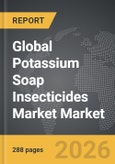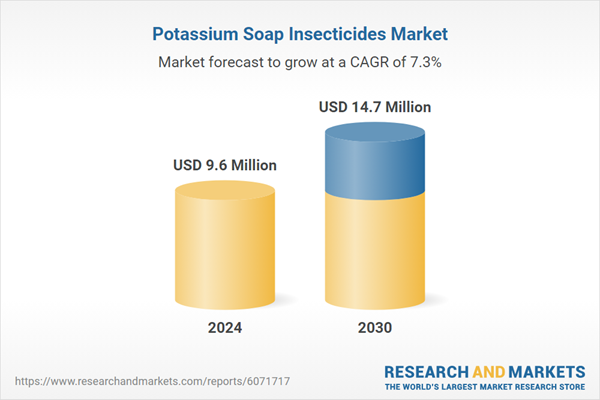Global Potassium Soap Insecticides Market - Key Trends & Drivers Summarized
How Are Potassium Soap Insecticides Revolutionizing Pest Control?
Potassium soap insecticides have gained significant traction in the agricultural and horticultural industries as a sustainable and eco-friendly alternative to conventional chemical pesticides. These insecticides, derived from natural fatty acids and potassium salts, effectively control soft-bodied pests such as aphids, whiteflies, spider mites, and mealybugs without harming beneficial insects, plants, or the environment. Their biodegradable nature and non-toxic properties make them a preferred choice for organic farming and integrated pest management (IPM) programs.The shift toward sustainable agriculture and consumer preference for organic produce have further accelerated the adoption of potassium soap insecticides. Unlike synthetic pesticides that pose risks of chemical residue accumulation, potassium soap insecticides break down quickly, leaving minimal environmental impact. Additionally, advancements in formulation technology have improved their efficacy, enhancing their ability to penetrate insect cuticles while maintaining plant safety. The increasing awareness of the harmful effects of traditional pesticides on human health and biodiversity has also fueled demand for these natural pest control solutions.
What Market Trends Are Shaping the Growth of Potassium Soap Insecticides?
The market for potassium soap insecticides is witnessing rapid expansion due to the rising demand for organic farming and sustainable pest control solutions. Governments and regulatory bodies worldwide are tightening restrictions on synthetic pesticides, further driving the shift toward natural alternatives. The European Union, for instance, has imposed stringent regulations on pesticide use, encouraging the adoption of bio-based insecticides such as potassium soaps. Similarly, in North America, organic certification standards favor non-toxic and environmentally friendly pest management solutions, bolstering the market for potassium soap-based products.Another key trend is the increasing use of potassium soap insecticides in urban gardening, home landscaping, and greenhouse cultivation. As urban dwellers become more conscious of chemical exposure in household and edible plants, they are turning to safer alternatives like potassium soap-based insecticides. Additionally, the growing prevalence of vertical farming and controlled-environment agriculture (CEA) has contributed to increased demand for bio-based insect control methods, as these high-tech farming systems prioritize sustainability and low environmental impact.
E-commerce has also played a pivotal role in the expansion of the potassium soap insecticides market. The availability of these products through online retail platforms has made them more accessible to a broader consumer base, including small-scale farmers, home gardeners, and agricultural professionals. As demand continues to rise, companies are focusing on product innovation, offering ready-to-use formulations, concentrated solutions, and multi-functional insecticidal soaps that provide added benefits such as fungal control and plant nourishment.
Which Regions Are Driving Market Expansion?
North America and Europe are leading the global potassium soap insecticides market, driven by strong regulatory support for organic farming and widespread awareness of sustainable agricultural practices. In the United States and Canada, organic farming acreage continues to grow, creating a favorable market environment for bio-based pest control solutions. The increasing adoption of IPM strategies in commercial agriculture and home gardening has further propelled market growth in these regions.Europe has also seen robust expansion due to the European Green Deal, which aims to reduce chemical pesticide use by 50% by 2030. Countries like Germany, France, and the Netherlands are at the forefront of organic farming initiatives, promoting the use of natural insecticides such as potassium soaps. Meanwhile, Latin America and Asia-Pacific are emerging as high-growth regions due to the increasing shift toward sustainable farming practices and the rising demand for residue-free agricultural products.
In developing countries, where chemical pesticide overuse has led to soil degradation and environmental concerns, potassium soap insecticides are being promoted as a safer alternative. Governments and agricultural extension programs are actively educating farmers on the benefits of bio-based pesticides, encouraging a gradual transition toward more sustainable pest control practices.
The Growth in the Potassium Soap Insecticides Market Is Driven by Several Factors
The increasing global emphasis on organic farming and pesticide residue reduction is one of the primary growth drivers for potassium soap insecticides. As consumer preferences shift toward chemical-free food products, agricultural producers are investing in natural pest control solutions that align with organic certification standards. Additionally, the rising adoption of regenerative agriculture, which focuses on soil health and biodiversity conservation, is further propelling the demand for non-toxic insect control methods.Technological advancements in formulation science have also contributed to market growth, with manufacturers developing enhanced potassium soap insecticides that offer improved pest control efficacy, longer shelf life, and compatibility with other bio-based agricultural inputs. The integration of precision agriculture technologies, such as drone-assisted pesticide application and AI-driven pest monitoring, is expected to further expand the potential of potassium soap insecticides in commercial farming.
Another key growth driver is the increasing availability of these insecticides across various distribution channels, including online marketplaces, agricultural cooperatives, and specialty gardening stores. The rise of direct-to-consumer (DTC) sales and subscription-based organic pest control solutions is making potassium soap insecticides more accessible to a diverse customer base. As regulatory policies continue to favor eco-friendly alternatives, and consumers demand safer agricultural inputs, the potassium soap insecticides market is poised for sustained growth in the coming years.
Report Scope
The report analyzes the Potassium Soap Insecticides market, presented in terms of market value (US$). The analysis covers the key segments and geographic regions outlined below:- Segments: Crop Type (Fruits & Vegetables Crops, Small Trees & Shrubs, Ornamental Trees, Oilseeds Crops, Herbs & Spices); Application (Horticulture Application, Indoor Gardening Application, Outdoor Gardening Application, Field Crops Application).
- Geographic Regions/Countries: World; United States; Canada; Japan; China; Europe (France; Germany; Italy; United Kingdom; Spain; Russia; and Rest of Europe); Asia-Pacific (Australia; India; South Korea; and Rest of Asia-Pacific); Latin America (Argentina; Brazil; Mexico; and Rest of Latin America); Middle East (Iran; Israel; Saudi Arabia; United Arab Emirates; and Rest of Middle East); and Africa.
Key Insights:
- Market Growth: Understand the significant growth trajectory of the Fruits & Vegetables Crops segment, which is expected to reach US$5.1 Million by 2030 with a CAGR of a 7.5%. The Small Trees & Shrubs segment is also set to grow at 8.8% CAGR over the analysis period.
- Regional Analysis: Gain insights into the U.S. market, valued at $2.6 Million in 2024, and China, forecasted to grow at an impressive 11.5% CAGR to reach $3.1 Million by 2030. Discover growth trends in other key regions, including Japan, Canada, Germany, and the Asia-Pacific.
Why You Should Buy This Report:
- Detailed Market Analysis: Access a thorough analysis of the Global Potassium Soap Insecticides Market, covering all major geographic regions and market segments.
- Competitive Insights: Get an overview of the competitive landscape, including the market presence of major players across different geographies.
- Future Trends and Drivers: Understand the key trends and drivers shaping the future of the Global Potassium Soap Insecticides Market.
- Actionable Insights: Benefit from actionable insights that can help you identify new revenue opportunities and make strategic business decisions.
Key Questions Answered:
- How is the Global Potassium Soap Insecticides Market expected to evolve by 2030?
- What are the main drivers and restraints affecting the market?
- Which market segments will grow the most over the forecast period?
- How will market shares for different regions and segments change by 2030?
- Who are the leading players in the market, and what are their prospects?
Report Features:
- Comprehensive Market Data: Independent analysis of annual sales and market forecasts in US$ Million from 2024 to 2030.
- In-Depth Regional Analysis: Detailed insights into key markets, including the U.S., China, Japan, Canada, Europe, Asia-Pacific, Latin America, Middle East, and Africa.
- Company Profiles: Coverage of players such as Acorn International, Aspen Medical Products, LLC, Babaka, BackJoy, BodyRite and more.
- Complimentary Updates: Receive free report updates for one year to keep you informed of the latest market developments.
Some of the 42 companies featured in this Potassium Soap Insecticides market report include:
- 7 Springs Farm
- Arbico Organics
- BONIDE Products LLC
- Certis USA L.L.C.
- Corax Bioner Co.
- Ecoworm Limited
- Growers Solution
- Hummert International
- Kao Corporation
- Murphy Oil Soap (Colgate-Palmolive)
- Neudorff North America
- Neudorff North America
- OHP, Inc. (AMVAC Chemical Corporation)
- PROMISOL S.A.
- Southern Agricultural Insecticides, Inc.
- SPAA SRL
- Thrive Garden
- Vellsam Materias Bioactivas S.L.
- Victorian Chemical Company Pty Ltd.
- W. Neudorff GmbH
This edition integrates the latest global trade and economic shifts into comprehensive market analysis. Key updates include:
- Tariff and Trade Impact: Insights into global tariff negotiations across 180+ countries, with analysis of supply chain turbulence, sourcing disruptions, and geographic realignment. Special focus on 2025 as a pivotal year for trade tensions, including updated perspectives on the Trump-era tariffs.
- Adjusted Forecasts and Analytics: Revised global and regional market forecasts through 2030, incorporating tariff effects, economic uncertainty, and structural changes in globalization. Includes historical analysis from 2015 to 2023.
- Strategic Market Dynamics: Evaluation of revised market prospects, regional outlooks, and key economic indicators such as population and urbanization trends.
- Innovation & Technology Trends: Latest developments in product and process innovation, emerging technologies, and key industry drivers shaping the competitive landscape.
- Competitive Intelligence: Updated global market share estimates for 2025, competitive positioning of major players (Strong/Active/Niche/Trivial), and refined focus on leading global brands and core players.
- Expert Insight & Commentary: Strategic analysis from economists, trade experts, and domain specialists to contextualize market shifts and identify emerging opportunities.
Table of Contents
Companies Mentioned (Partial List)
A selection of companies mentioned in this report includes, but is not limited to:
- 7 Springs Farm
- Arbico Organics
- BONIDE Products LLC
- Certis USA L.L.C.
- Corax Bioner Co.
- Ecoworm Limited
- Growers Solution
- Hummert International
- Kao Corporation
- Murphy Oil Soap (Colgate-Palmolive)
- Neudorff North America
- Neudorff North America
- OHP, Inc. (AMVAC Chemical Corporation)
- PROMISOL S.A.
- Southern Agricultural Insecticides, Inc.
- SPAA SRL
- Thrive Garden
- Vellsam Materias Bioactivas S.L.
- Victorian Chemical Company Pty Ltd.
- W. Neudorff GmbH
Table Information
| Report Attribute | Details |
|---|---|
| No. of Pages | 288 |
| Published | January 2026 |
| Forecast Period | 2024 - 2030 |
| Estimated Market Value ( USD | $ 9.6 Million |
| Forecasted Market Value ( USD | $ 14.7 Million |
| Compound Annual Growth Rate | 7.3% |
| Regions Covered | Global |









